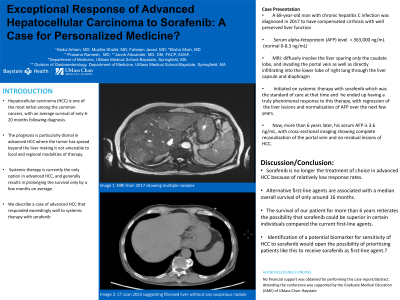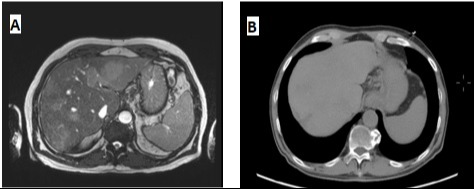Sunday Poster Session
Category: Liver
P1362 - Exceptional Response of Advanced Hepatocellular Carcinoma to Sorafenib: A Case for Personalized Medicine?
Sunday, October 27, 2024
3:30 PM - 7:00 PM ET
Location: Exhibit Hall E

Has Audio
- AA
Abdul Arham, MD
Baystate Medical Center
Chicopee, MA
Presenting Author(s)
Abdul Arham, MD1, Musfira Khalid, MBBS2, Faheem Javad, MBBS3, Elisha Shah, DO4, Prasana ramesh, MD4, Jacob Alexander, MD, DM4
1Baystate Medical Center, Chicopee, MA; 2Fatima Jinnah Medical University, Mississauga, ON, Canada; 3Al-Nafees Medical College, Mississauga, ON, Canada; 4Baystate Medical Center, Springfield, MA
Introduction: Hepatocellular carcinoma (HCC) is one of the most lethal among the common cancers, with an average survival of only 6-20 months following diagnosis. The prognosis is particularly dismal in advanced HCC where the tumor has spread beyond the liver making it not amenable to local and regional modalities of therapy. Systemic therapy is currently the only option in advanced HCC, and generally results in prolonging the survival only by a few months on average. We describe a case of advanced HCC that responded exceedingly well to systemic therapy with sorafenib.
Case Description/Methods: 68 y/o man with chronic hepatitis C infection was diagnosed in 2017 to have compensated cirrhosis with well-preserved liver function. Initial laboratory evaluation revealed a serum alpha-fetoprotein (AFP) level of more than 363,000 ng/mL (normal 0-8.3 ng/mL), and a diagnosis of advanced HCC was made based on typical imaging findings on MRI abdomen. The tumor was found to diffusely involve the liver sparing only the caudate lobe, and invading the portal vein as well as directly infiltrating into the lower lobe of right lung through the liver capsule and diaphragm. He was initiated on systemic therapy with sorafenib which was the standard of care at that time. He received a 50% reduced dose of 200 mg twice daily and did develop some minor skin side effects but did not require any interruption of therapy. He ended up having a truly phenomenal response to this therapy, with regression of the liver lesions and normalization of AFP over the next few years. Now, more than 6 years later, his serum AFP is 3.6 ng/mL, with cross-sectional imaging showing complete recanalization of the portal vein and no residual lesions of HCC.
Discussion: Sorafenib is no longer the treatment of choice in advanced HCC because of relatively low response rates. Alternative first-line agents are associated with a median overall survival of only around 16 months. The survival of our patient for more than 6 years reiterates the possibility that sorafenib could be superior in certain individuals compared the current first-line agents. Similar such cases that respond exceptionally well to sorafenib have occasionally been reported in literature. Identification of a potential biomarker for sensitivity of HCC to sorafenib would open the possibility of prioritizing patients like this to receive sorafenib as first-line agent.

Disclosures:
Abdul Arham, MD1, Musfira Khalid, MBBS2, Faheem Javad, MBBS3, Elisha Shah, DO4, Prasana ramesh, MD4, Jacob Alexander, MD, DM4. P1362 - Exceptional Response of Advanced Hepatocellular Carcinoma to Sorafenib: A Case for Personalized Medicine?, ACG 2024 Annual Scientific Meeting Abstracts. Philadelphia, PA: American College of Gastroenterology.
1Baystate Medical Center, Chicopee, MA; 2Fatima Jinnah Medical University, Mississauga, ON, Canada; 3Al-Nafees Medical College, Mississauga, ON, Canada; 4Baystate Medical Center, Springfield, MA
Introduction: Hepatocellular carcinoma (HCC) is one of the most lethal among the common cancers, with an average survival of only 6-20 months following diagnosis. The prognosis is particularly dismal in advanced HCC where the tumor has spread beyond the liver making it not amenable to local and regional modalities of therapy. Systemic therapy is currently the only option in advanced HCC, and generally results in prolonging the survival only by a few months on average. We describe a case of advanced HCC that responded exceedingly well to systemic therapy with sorafenib.
Case Description/Methods: 68 y/o man with chronic hepatitis C infection was diagnosed in 2017 to have compensated cirrhosis with well-preserved liver function. Initial laboratory evaluation revealed a serum alpha-fetoprotein (AFP) level of more than 363,000 ng/mL (normal 0-8.3 ng/mL), and a diagnosis of advanced HCC was made based on typical imaging findings on MRI abdomen. The tumor was found to diffusely involve the liver sparing only the caudate lobe, and invading the portal vein as well as directly infiltrating into the lower lobe of right lung through the liver capsule and diaphragm. He was initiated on systemic therapy with sorafenib which was the standard of care at that time. He received a 50% reduced dose of 200 mg twice daily and did develop some minor skin side effects but did not require any interruption of therapy. He ended up having a truly phenomenal response to this therapy, with regression of the liver lesions and normalization of AFP over the next few years. Now, more than 6 years later, his serum AFP is 3.6 ng/mL, with cross-sectional imaging showing complete recanalization of the portal vein and no residual lesions of HCC.
Discussion: Sorafenib is no longer the treatment of choice in advanced HCC because of relatively low response rates. Alternative first-line agents are associated with a median overall survival of only around 16 months. The survival of our patient for more than 6 years reiterates the possibility that sorafenib could be superior in certain individuals compared the current first-line agents. Similar such cases that respond exceptionally well to sorafenib have occasionally been reported in literature. Identification of a potential biomarker for sensitivity of HCC to sorafenib would open the possibility of prioritizing patients like this to receive sorafenib as first-line agent.

Figure: Image 1: MRI from 2017 showing multiple nodules
Image 2: CT scan 2023 suggesting fibrosed liver without any suspicious nodule
Image 2: CT scan 2023 suggesting fibrosed liver without any suspicious nodule
Disclosures:
Abdul Arham indicated no relevant financial relationships.
Musfira Khalid indicated no relevant financial relationships.
Faheem Javad indicated no relevant financial relationships.
Elisha Shah indicated no relevant financial relationships.
Prasana ramesh indicated no relevant financial relationships.
Jacob Alexander indicated no relevant financial relationships.
Abdul Arham, MD1, Musfira Khalid, MBBS2, Faheem Javad, MBBS3, Elisha Shah, DO4, Prasana ramesh, MD4, Jacob Alexander, MD, DM4. P1362 - Exceptional Response of Advanced Hepatocellular Carcinoma to Sorafenib: A Case for Personalized Medicine?, ACG 2024 Annual Scientific Meeting Abstracts. Philadelphia, PA: American College of Gastroenterology.
